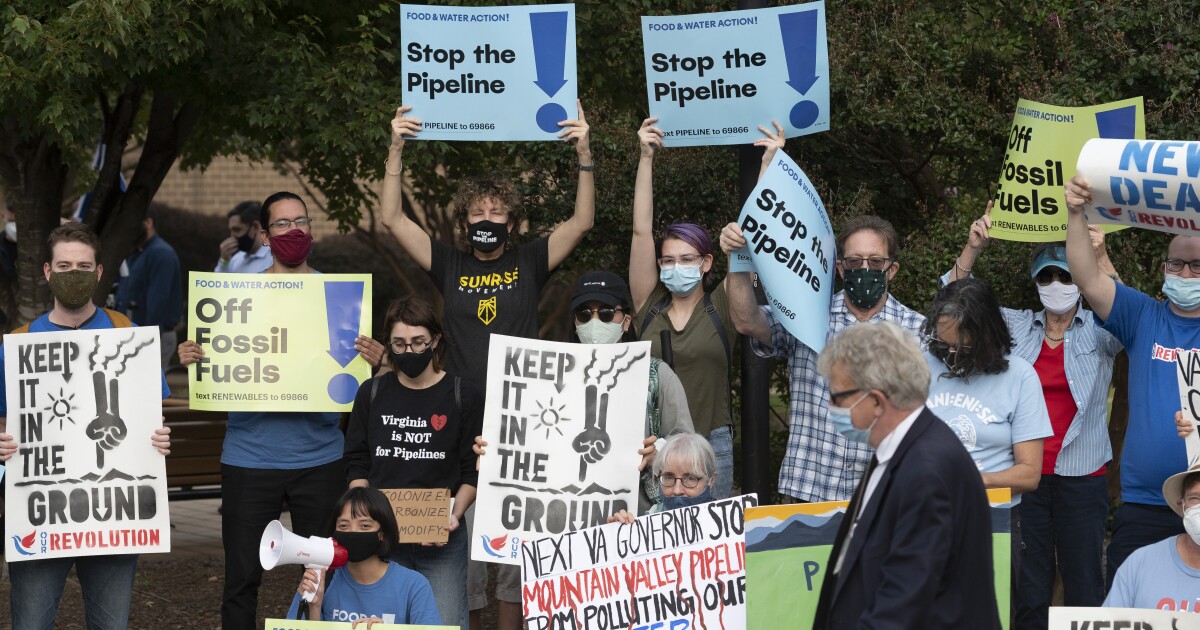

A federal appeals court vacated a key state water permit for the Mountain Valley Pipeline on Monday, a decision expected to delay further completion of the natural gas pipeline, the construction of which some members of Congress have sought to approve unilaterally.
The 4th Circuit’s decision is another setback for the project, which environmental and local interest groups have been challenging in court for nearly a decade on the grounds that it will degrade the environment and make climate change worse.
WHERE THINGS STAND AFTER THE PASSAGE OF HR1
A three-judge panel unanimously vacated and remanded its water quality certification to the West Virginia Department of Environmental Protection. A water quality certification is a permit issued under the Clean Water Act that serves as a precondition the Army Corps of Engineers must issue for a project.
The court outlined a number of procedural deficiencies with the WVDEP’s certification, one of which was that it failed to give an adequate explanation for declining to perform a location-specific antidegradation review in the permitting process. The Clean Water Act requires states’ water quality standards to adopt an antidegradation policy to weigh the pros and cons of a proposed activity that could degrade water quality.
The judges also ruled that West Virginia failed to consider adequately the pipeline developer’s past water quality violations in its certification process.
“Although the Department acknowledged MVP’s violation history, it failed to dispel the tension between MVP’s checkered past and its confidence in MVP’s future compliance,” the court said.
The ruling is expected to delay completion further and to delay the operation of the pipeline, which is nearly 94% complete, according to its developer, Mountain Valley Pipeline, LLC. The developer sought to have the pipeline in service by year’s end.
Appalachian Voices, one of the environmental petitioners challenging the permit, celebrated the court’s ruling and said the pipeline ought to be nixed.
“West Virginia communities have endured Mountain Valley Pipeline’s damage to their water resources and environment for far too long,” Jessica Sims, Virginia field coordinator for Appalachian Voices, said in a statement. “The WVDEP’s insufficient safeguards have been exposed, and this ruinous project must be canceled.”
Developers initiated MVP, a natural gas pipeline stretching more than 300 miles from northwestern West Virginia to southern Virginia, in 2014.
Opponents have successfully thwarted the project on several fronts, litigating against various permits the pipeline must receive in order to be constructed and operated. In February 2022, the 4th Circuit vacated the Forest Service’s biological opinion for the pipeline, which it issued during the Trump administration.
Challengers most recently lost a bid to have the Fourth Circuit toss a lower court decision that upheld Virginia’s water quality certification for MVP.
MVP and its fate has taken hold in Washington, D.C., where Sen. Joe Manchin (D-WV) is championing its completion.
Manchin, who led the Energy and Natural Resources Committee, introduced legislation to reform federal environmental permitting for energy projects last year containing directions to all relevant agencies to issue permits approving the pipeline.
The proposal also sought to remove all litigation related to the pipeline from the 4th Circuit to the D.C. Circuit Court of Appeals.
The legislation failed several attempts at passage at the end of the last Congress. Some lawmakers viewed the pipeline as a pet project for Manchin, and it was the only such project given a line item in the bill.
CLICK HERE TO READ MORE FROM THE WASHINGTON EXAMINER
Rep. Carol Miller (R-WV) sought to have Mountain Valley approval tacked on as an amendment to H.R. 1, Republicans’ energy and environmental permitting package that passed on Thursday, but that amendment failed.





